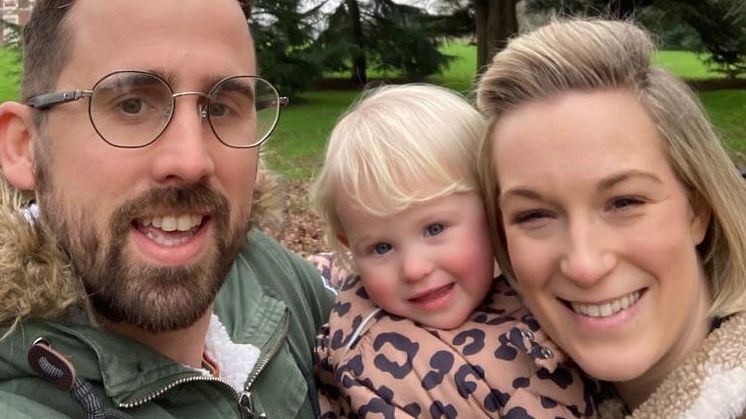
Press release -
Havant stroke survivor pleads for more to be invested in research
A personal trainer from Havant who had a stroke while leading an online class has backed the Stroke Association’s call for more research into the UK’s fourth biggest killer.
Glen Eastick also wants people to realise that stroke can affect people who are young and fit – he was just 33 when he had his stroke in July 2020.
Glen’s symptoms started while he was preparing his lunch. “I briefly lost the use of my arm for about ten seconds and dribbled a bit but then continued making lunch,” said Glen.
“Then when I went into my next online session I realised I couldn’t talk. Nothing was coming out except the odd word. My client was saying are you ok?
“My girlfriend Bex was out on a walk with our six-week-old baby Evie and as soon as she came back she realised something was wrong as I was struggling to talk. She called the ambulance and I was rushed into hospital.”
Ironically, the stroke specialty doctor waiting to treat Glen at the Queen Alexandra Hospital in Portsmouth, was James Beckett who is also one of his personal fitness clients.
A scan confirmed that Glen had had a stroke and he was thrombolysed – given special drugs to dissolve the clot which was blocking the blood supply and killing cells in his brain.
Thanks to the prompt action by Bex who spotted the “FAST” stroke symptoms, the skills of hospital staff and his own determination, Glen has made a good recovery.
Doctors found that his stroke was caused by a PFO ‘hole in the heart’ which allowed clots to travel between the chambers of his heart and up to his brain. In July 2021 he had an operation to close this hole at the John Radcliffe Hospital in Oxford.
Now Glen is backing the Stroke Association’s call for more research into stroke. Despite the devastating impact of stroke, stroke research is chronically underfunded and receives far less funding than other health conditions that have similar life-long effects
Data shows that annually, only 1.2 per cent of research budgets (approx. £30m) are spent on stroke, compared with 14.8 per cent (approx. £400m) on cancer, while there are 1.3m people living with the effects of stroke in the UK and 2.5m living with cancer.
“I’ve been very fortunate to make a good recovery but other aren’t so fortunate which is why research is so important,” said Glen.
“I think research into PFOs or why blood tends to clot more in some people than others may help. I also believe that research into medication could be done more as I am on the drug clopidogrel at the moment. I am taking it, but the idea of being on medication for the rest of my life doesn’t fill me with joy.
“As a personal trainer I specialise with people in health conditions such as MS and stroke so I know all about them but never thought it would happen to me.
“After my stroke I took all of my theory and made it relevant for myself. I knew what I should and shouldn’t do to get me back into running again. It can be quite unnerving to go back into exercise after a stroke and you worry it might happen again. You worry that you can’t trust your body any more.
“I am proud that I beat my 10k personal best 3 months after heart surgery.”
Jacqui Cuthbert, the charity’s associate director, said: “Stroke strikes every five minutes in the UK and while it changes lives in an instant, the brain can adapt and rebuild after stroke. That’s why research means everything to our nation’s 1.3 million stroke survivors and their families, because of the life-changing impact it could have on their future.
“Our pioneering research has been at the centre of major breakthroughs that have saved lives and sparked innovation in stroke care and treatment.
“From laying the foundations for the Act FAST campaign, one of the most successful public health awareness campaigns in England, to funding early research into the emergency stroke treatment thrombectomy (the manual removal of stroke-causing blood clots), many patients have been spared the most devastating effects of stroke as a result of our research.
“Despite stroke still being the fourth biggest killer in the UK, research has helped to more than halve the rate of deaths from stroke over the last three decades. It’s absolutely crucial that we continue this progress, but we can’t do this without vital funding. Far less is spent ‘per survivor’ on research into stroke than on research into any other health condition.
“We would never want to take researchers or money away from other conditions such as cancer, but we do want to replicate the success that cancer research has had, so that we can continue to make breakthroughs in stroke treatment and care.
“Donate to help fund the research that could mean everything to stroke survivors and their loved ones. Funds raised will go towards vital services for stroke survivors across the UK, including support and pioneering research.”
Topics
Categories
- Stroke strikes every five minutes in the UK and it changes lives in an instant.
- The Stroke Association is a charity working across the UK to support people to rebuild their lives after stroke. We believe that everyone deserves to live the best life they can after stroke. From local support services and groups, to online information and support, anyone affected by stroke can visit stroke.org.uk or call our dedicated Stroke Helpline on 0303 3033 100 to find out about support available locally.
- Our specialist support, research and campaigning are only possible with the courage and determination of the stroke community and the generosity of our supporters. With more donations and support, we can help rebuild even more lives.
- You can follow us on Twitter, Facebook and Instagram.


